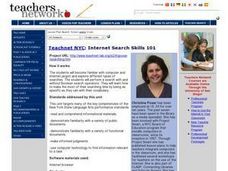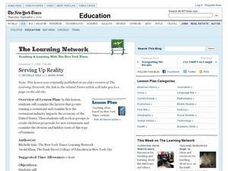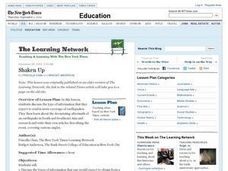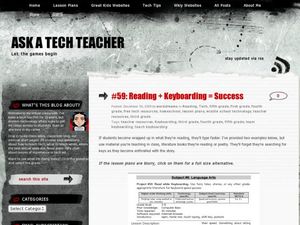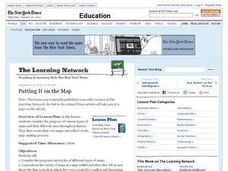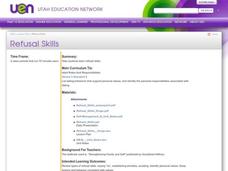Curated OER
Rain Forest Adventures
Students discover locations of the world's rain forests. Once they identify the animals, plants, products, and resources located in them, they construct they own rain forest terrariums. By comparing and contrasting the two types of...
Teach Engineering
Red Rover Robotics
Help your class understand the importance of exploration using robots. with a resource that provides a short history of robotics as a lead into looking at Martian robotic exploration missions. The activity specifically looks at the...
Teach Engineering
Keepers of the Gate Journal and Brainstorm
The second segment of a seven-part series reviews the challenge of determining whether gargling with salt water helps a sore throat. Individuals journal what they know about the challenge and what they are trying to figure out to...
California Department of Education
What Matters to Me?
Whether you're a self-starting entrepreneur or a cubicle commando, finding a career that suits your personality is a must! The second lesson in a series of five career and college lesson plans focuses on work ethic and values. Learners...
Curated OER
So You Want to Drive an Automobile?
High schoolers research types of auto insurance that are required in the state of Florida. They choose an automobile and find the cost of insurance to legally drive it.
Curated OER
An Opportunity to access and use the Internet for Research and Study.
Students analyze how to begin hands on research for science projects and experiments. They develop a problem and design a systematic effort to resolve it.
Curated OER
Using Wikis in the Classroom
Learners write a review of a music video. They discuss the review online about the music video. Students create a fan's webpage featuring artist news and biographical information. They discuss what types of music they like listening to,...
Curated OER
Internet Search Skills 101
Young scholars practice computer and Internet jargon and explore different types of searches. They perform a search with and without Boolean search operators. In addition, they practice how to make the most of their searching time by...
Curated OER
Discriminating Issues
Students examine how U.S. Law Defines Discrimination In this lesson. They research the issues surrounding a variety of types of discrimination, and then write editorials analyzing legal and social positions on discrimination in the...
Curated OER
The Probability Project
Students work together to complete a project on probability. In groups, they solve probability equations based on the formula and scenerio given to them in a PowerPoint presentation. To end the lesson, they take a quiz on each problem...
Curated OER
Simple Machines
Third graders examine and identify the six types of simple machines. Using a model of each simple machine, they demonstrate the state the function of them to the class. They discover examples of simple machines at school and home and...
Curated OER
5.1 Basic UNIX Commands
Students are able to understand the function of an operating system. They become familiar with the UNIX file system. Students become aware of the types of file users and file access levels. They are able to use basic UNIX commands.
Curated OER
Serving Up Reality
Learners consider the factors that go into running a restaurant and examine how the restaurant industry impacts the economy of the United States. They create skeleton proposals for new restaurants and consider the costs of this type of...
Curated OER
Fuel for Thought
Students explore the mathematical concepts used to compare different types of vehicles. They create a print advertisement in which they persuade an audience to purchase a specific vehicle.
Curated OER
Shaken Up
Young scholars discuss the type of information that they expect to read in news coverage of earthquakes. They explore the devastating aftermath of an earthquake in South and Southeast Asia and research and write their own articles...
Curated OER
BUS: Farming: It's A Fact (Ag)
Pupils create two different types of graphs from the information in the "Farm Facts" booklet (i.e., bar graph, pie chart, etc.). They calculate where your food dollars are spent (on and off farm).
Curated OER
Tree Trekkers
Students explore different types of trees. For this tree lesson, students use a digital camera to photograph trees in their area and upload them to a computer. Students will share their findings by using their photos to make a booklet or...
Curated OER
Reading + Keyboarding= Success
Students practice their keyboarding skills. In this typing lesson plan, students use interesting stories to practice their skills. They practice throughout the semester and then monitor their improvement.
Curated OER
Don't Print Homework-Email It!
Students practice emailing their homework. In this technology lesson, students review how to type an email address correctly and how to send it to the correct address. Students complete their homework and send it to their teacher.
Curated OER
Peter The Butterfly
Students complete an interdisciplinary unit chronicling the life cycle and movement patterns of the butterfly. Through language arts, mathematics, and science activities, students identify various types of butterflies and document the...
Curated OER
Collections Connect Four
In this items that come in bunches instructional activity, students play a Connect Four type game with vocabulary words that name things that come in bunches. They work with words to make matches such as geese/gaggle, and to get four...
Curated OER
Putting It on the Map
Students consider the purpose of various types of maps and their different uses throughout history. They create their own maps and reflect on the map-making process.
Curated OER
Refusal Skills
Pupils analyze the relationship between values and refusal skills. They review types of refusal skills: saying 'no', establishing priorities, avoiding and identify personal values. They determine to keep actions and behavior consistent...
Curated OER
Universal Studios' Roller Coasters
Students read an article and review a type of graph or other graphic representation. They write a response to a ""Task"" that may be a letter, a report, or a speech to an interested group. In the written response they must refer to both...









